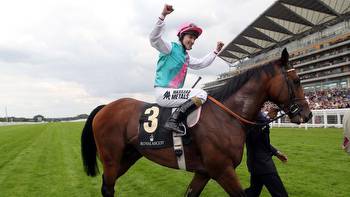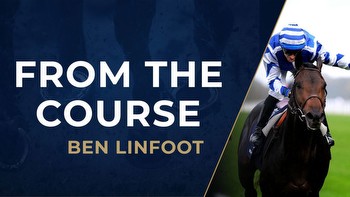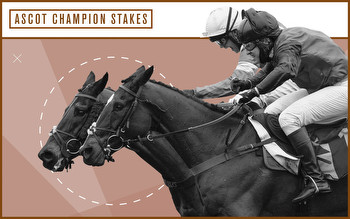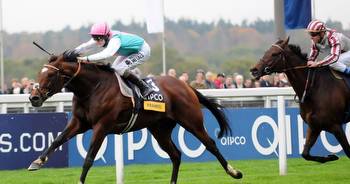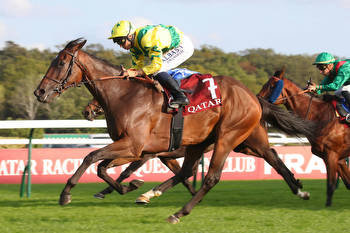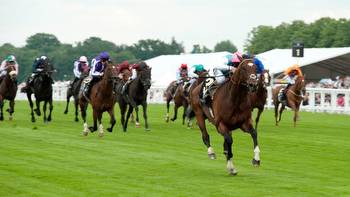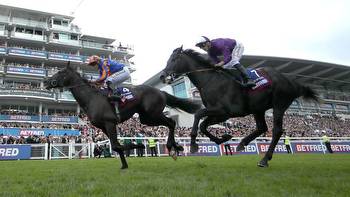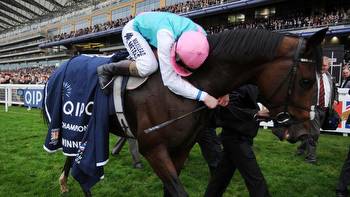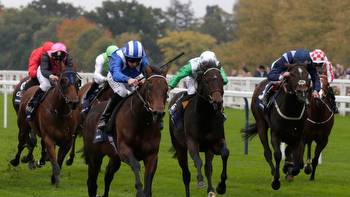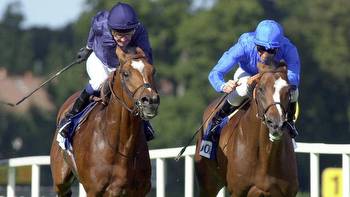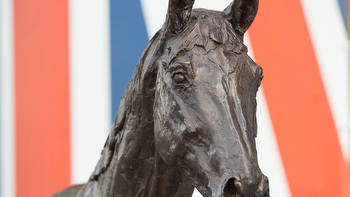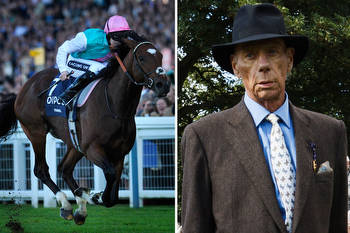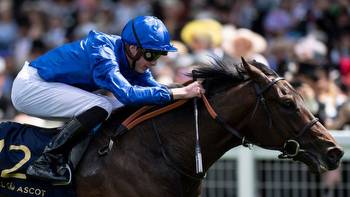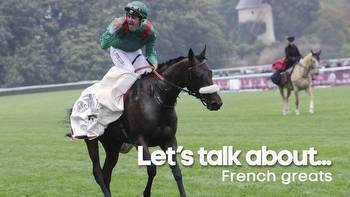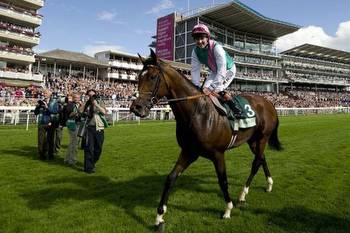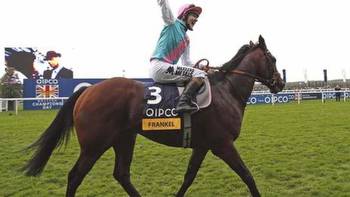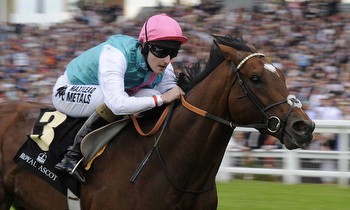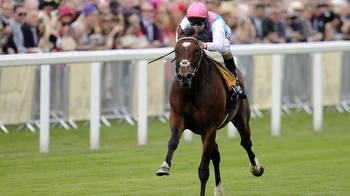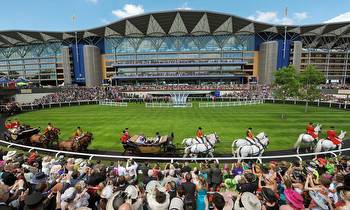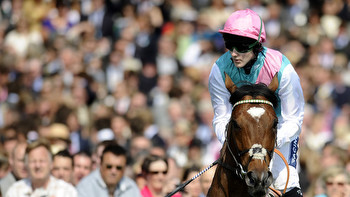Flashback: Frankel achieves perfection in Champion Stakes
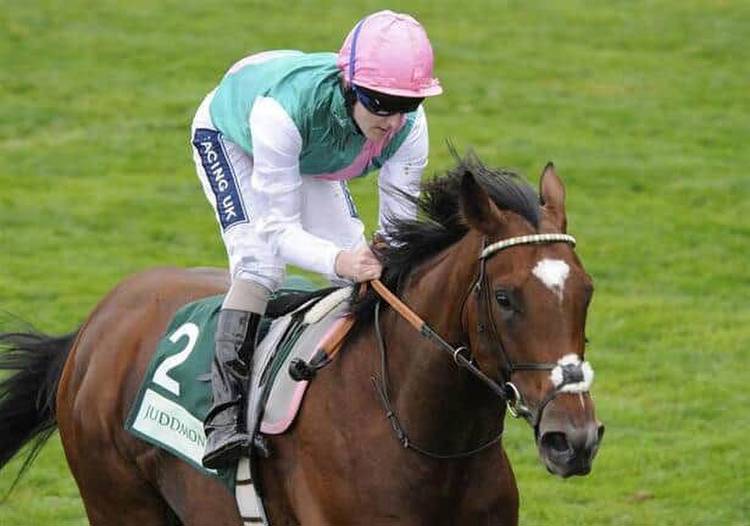
So many times, when a racehorse is trying to pull off an undefeated career, a challenger comes along to spoil the party. Native Dancer lost the Kentucky Derby to Dark Star. Man o' War lost the Sanford to Upset. Zenyatta lost the Breeders' Cup Classic to Blame in the final start of her career.
But once in a long while, storybook endings do come true. Having a little help from your family never hurts.
On Oct. 20, 2012 at Ascot Racecourse in England, the undefeated Frankel made the final start of his acclaimed career in the prestigious 1 1/4-mile Champion Stakes (G1). Racing over a distance longer than his best, and over a rain-soaked course softer than ideal, there was concern that the colt's brilliant turn-of-foot would be compromised by the conditions. There was even talk of withdrawing him from the race.
Challenging conditions weren’t the only formidable obstacle facing Frankel in the Champion Stakes. Lining up against him in the Ascot starting gate was one of the best horses in Europe: Cirrus Des Aigles. Winner of the 2011 Champion Stakes against an elite field, the talented gelding entered the 2012 renewal fresh off a nine-length victory in the Prix Dollar (G2) over heavy ground. Whereas Frankel was a question mark over the soft going at Ascot, Cirrus Des Aigles figured to relish the testing conditions.
Had Frankel been an ordinary horse—or even a very good horse—such circumstances would have been insurmountable. But Frankel wasn’t ordinary; he was extraordinary. As he entered the starting gate for the final time, with a mile and a quarter of rain-soaked turf in front of him, bettors still believed he would win the day, favoring the superstar at 2-11. Cirrus Des Aigles was the second choice at 9-2, and the longest shot in the betting was Frankel’s half-brother and pacemaker Bullet Train, disregarded at odds of 100-1.
Barring any surprises, it was assumed Frankel would overcome all obstacles and retire undefeated.
Then the gates opened and Frankel broke slowly—even sluggishly—and spotted his rivals a length or two before racing up to settle in fifth place out of six runners. Up front, Cirrus Des Aigles was galloping happily over the soft turf, securing an easy lead as Bullet Train surprisingly employed rating tactics.
These unexpected circumstances placed Frankel in an awkward position. Racing behind a slow pace, while traveling 1 1/4 miles over soft turf, was a world away from what anyone had anticipated. Wasn't Bullet Train supposed to be on the lead? Wasn't Frankel supposed to be just a length or two behind him, daring Cirrus Des Aigles to catch up? It was concerning to see the roles reversed, with Frankel attempting to close ground under challenging circumstances against a true stayer loose on an easy lead.
Indeed, the superhorse appeared vulnerable. Would he be able to make up the necessary ground? Would he be able to accelerate over the sodden turf course? Would he be able to retire undefeated, joining elite European greats like Nearco, Ribot, and Sea the Stars? Or would he end his career with valiant (but nonetheless disappointing) defeat at the hands of a mere mortal?
If he had been alone, the result might have been defeat.But Frankel wasn’t alone. There was still Bullet Train.
For months, Bullet Train had toiled in the shadows of his more illustrious stablemate, serving as a target for Frankel to casually chase until the real running began. On five occasions in the past he’d performed his duties without unnecessary drama or excitement. Now, with more at stake than ever before, it was Bullet Train’s turn to shine.
For half a mile or so, Bullet Train had bided his time, his rider repeatedly glancing back in search of Frankel. As the favorite gradually worked his way back into contention, the two stablemates reached even terms. For a few moments they ran together, and it’s tempting to romanticize the story and speculate that they exchanged words, reconfiguring their strategy on the fly.
In any case, Bullet Train suddenly unleashed a burst of acceleration, rallying along the rail to engage Cirrus Des Aigles for the lead. The latter accepted the challenge eagerly, increasing his speed to try and reclaim the advantage. But Bullet Train refused to yield, holding his own against Cirrus Des Aigles and forcing the pace to quicken. All around the sweeping Ascot turn, Bullet Train locked horns against his vastly superior rival, courageously performing above and beyond the call of duty while finally enjoying an all-too-brief moment in the spotlight.
They turned for home and Bullet Train gave way; there was nothing left in his tank. He had done his duty admirably one final time. He would finish last, as most pacemakers do, yet in a way he would share the impending glory.
Cirrus Des Aigles had reclaimed the advantage, but not without cost. His run with Bullet Train had taken a toll, and although he entered the straight in command of the lead—with a repeat victory in the Champion Stakes looming ahead—a menacing presence was quickly emerging on the far outside.
Frankel was coming.
As Bullet Train retreated through the field, the horse who didn't care for the course—who didn't care for the distance—who didn't break as expected—was rallying into contention. For one more brief moment, pacemaker and superstar were on even terms again. Two half-brothers, one an immortal legend of the turf, one a footnote in the annals of racing history. But for that brief moment, they were equals playing two halves of the same song. Bullet Train had completed the verses to perfection. Now it was time for Frankel to play out the chorus.
A quarter of a mile from home, Frankel moved up to engage Cirrus Des Aigles for supremacy, and the two great champions matched strides. Victory still wasn’t guaranteed. There would be no brilliant turn-of-foot; no double-digit margin of victory. This was the moment of truth. With his undefeated record on the line, Frankel entered the final few hundred yards of his racing career with a rival of unquestionable talent clinging to his inside, stubbornly refusing to be beaten.
With thousands of fans cheering him on—even Queen Elizabeth II—Frankel dug deep and found something extra. Slowly at first, and then faster, he inched away from Cirrus Des Aigles. As the cheering increased, so did Frankel’s advantage; the denouement of his career had arrived. During the final hundred yards, the last chapter of Frankel's career came to a close. He had answered every question asked of him, and passed every test thrown his way.
He had beaten Cirrus Des Aigles.
The final margin of victory was 1 3/4 lengths. The final time was 2:10.22. Neither was particularly impressive by Frankel's own lofty standards, but it hardly mattered. Frankel had accomplished everything that had been asked of him and overcome formidable odds to retire undefeated against the best horses in Europe.
As Frankel journeyed to the winner's circle, with the crowd roaring in appreciation, Bullet Train exited the course with considerably less acclaim. It will be many years before we encounter another horse of Frankel's magnitude. But at the same time, it will be many years before we see an ordinary pacemaker complete his duties so perfectly, on the greatest of stages, against the strongest of rivals.
If not for Bullet Train’s brave run on the Ascot turn, the story of Frankel might have had a very different ending.

